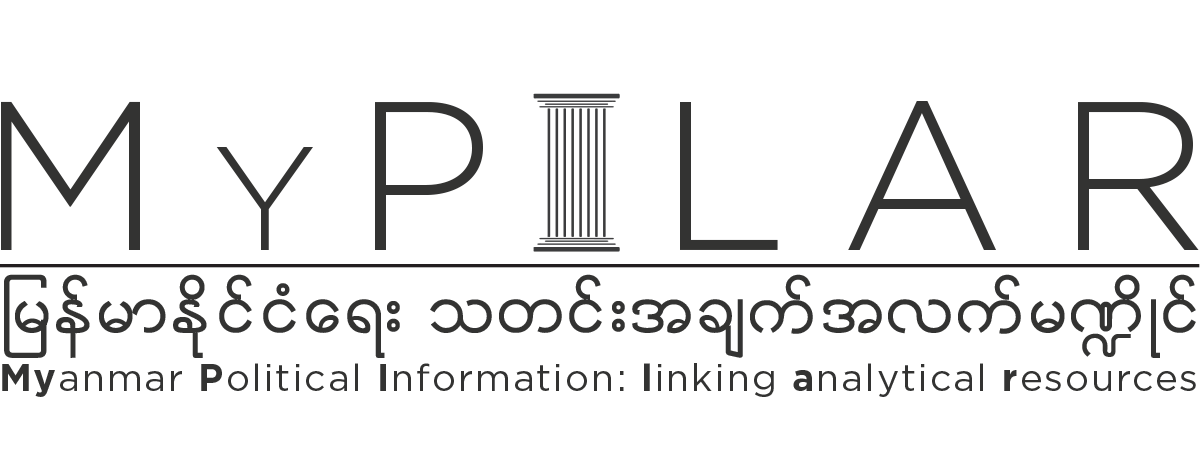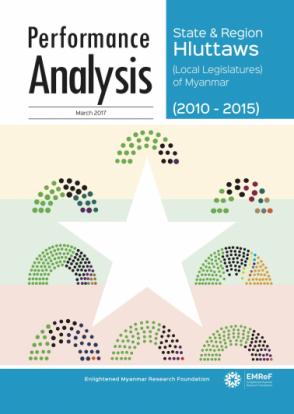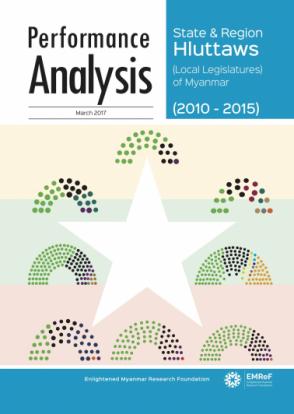တိုင်းဒေသကြီး/ပြည်နယ်လွှတ်တော်များ(သို့မဟုတ်) ဒေသဥပဒေပြုရေးမဏ္ဍိုင်များသည် မြန်မာနိုင်ငံရေး အခြေခံ အဆောက်အအုံ၏ထောက်တိုင်များ ဖြစ်ပါသည်။ ၎င်းတို့သည် မြန်မာနိုင်ငံတွင် ဖက်ဒရယ်စနစ်တစ်ရပ် ပုံဖော်တည် ဆောက်ရာတွင် အထူးအရေးပါသည်။ ယင်းသို့ တိုင်းဒေသကြီး/ပြည်နယ်လွှတ်တော်များသည် တိုင်းဒေသကြီး/ပြည်နယ် အစိုးရများ၏ အဓိကအစိတ်အပိုင်းများအနေဖြင့် ၂ဝဝ၈ ဖွဲ့စည်းအုပ်ချုပ်ပုံအခြေခံဥပဒေအရပင်လျှင် အရေးပါသော အခန်းကဏ္ဍကို အပ်နှင်းထားသော်လည်း ၎င်းတို့ခိုင်မာအားကောင်းရေးအတွက် အလေးပေးကြိုးပမ်းမှုများ နည်းပါးလျက် ရှိသည်။ တစ်ဖန်တိုင်းဒေသကြီး/ပြည်နယ်အုပ်ချုပ်ရေးနှင့် လွှတ်တော်အဖွဲ့အစည်းများသည် ၂ဝ၁၅ ရွေးကောက်ပွဲအပြီး နောက်ပိုင်း နိုင်ငံရေးအာဏာအခင်းအကျင်းအသစ်သို့ ကူးပြောင်းဝင်ရောက်မှု အပြောင်းအလဲ၏သက်ရောက်မှုကိုလည်း ခံစားရပြန်သည်။ အထူးသဖြင့် တိုင်းဒေသကြီး/ပြည်နယ်လွှတ်တော်များသည် ပြည်ထောင်စုအစိုးရအား ထိန်းကျောင်း သည့်ဖက်ဒရယ်အဖွဲ့အစည်းများအဖြစ် ပီပြင်စွာရပ်တည်နိုင်သည့် အခြေအနေသို့ရောက်ရှိရန် ဝေးကွာလျက်ရှိရုံမျှမက ဒေသအုပ်ချုပ်ရေးအဖွဲ့အစည်းများကို ထိရောက်စွာထိန်းကျောင်းနိုင်သည့် အခြေအနေတွင်ပင်မရှိပေ။ ယင်းတိုင်းဒေသကြီး/ပြည်နယ်လွှတ်တော်များသည် ဖက်ဒရယ်အဖွဲ့အစည်းများအဖြစ် ခိုင်မာအားကောင်းလာစေရေးအတွက် ဖွဲ့စည်းပုံဆိုင်ရာအတားအဆီးများအပြင် အဖွဲ့အစည်းဆိုင်ရာနှင့် လူတစ်ဦးချင်း၏အရည်အသွေးအားနည်းမှုများသည် အကန့်အသတ်များ သဖွယ်၊ အဆီးအတားများသဖွယ် ဖြစ်လျက်ရှိသည်။ ဤသို့သော အကြောင်းအချက်များက ဗဟိုချုပ်ကိုင်မှုစနစ်ဖြေလျှော့ရေးအတွက်လည်း အတားအဆီးသဖွယ်ဖြစ်သည်။
ယခုအစီရင်ခံစာသည် ၂ဝ၁ဝ-၂ဝ၁၅ ပထမအကြိမ် တိုင်းဒေသကြီး/ပြည်နယ်လွှတ်တော်များ၏ စွမ်းဆောင်ရည်ကို သုံးသပ်ပြီး ယင်းသုံးသပ်မှုမှရရှိလာသော လေ့လာတွေ့ရှိချက်များကိုအခြေခံ၍ ယင်းလွှတ်တော်များ ခိုင်မာအားကောင်း လာစေရေး အထောက်အပံ့ဖြစ်စေရန် အကြံပြုချက်များပေးလိုခြင်းဖြစ်သည်။ ယင်းအကြံပြုချက်များသည် မူဝါဒချမှတ်သူ များ၊ နိုင်ငံရေးတွင် ပါဝင်လှုပ်ရှားသူများ
အရပ်ဖက်အဖွဲ့အစည်းများ၊ နိုင်ငံတကာအလှူရှင်အသိုင်းအဝိုင်း၊ ကျွမ်းကျင်သူပညာရှင်များများအတွက် ရည်ရွယ်ပါသည်။ အထူးအားဖြင့် တိုင်းဒေသကြီး/ပြည်နယ်လွှတ်တော်များ အားကောင်းစေရေး အတွက် ၎င်းတို့ကိုယ်တိုင်ပုံမှန်လေ့လာသုံးသပ်ခြင်း၊ အရပ်ဘက်အဖွဲ့အစည်းများနှင့် ပြည်တွင်း/နိုင်ငံတကာသုတေသန အဖွဲ့အစည်းများမှ လေ့လာအကဲဖြတ် အကြံပြုချက်များပေးနိုင်ရေးအတွက် ယခုအစီရင်ခံစာသည် အခြေခံမှီငြမ်းပြုနိုင် သော စာတမ်းသဖွယ်ဖြစ်ပါသည်။ ယခုလေ့လာသုံးသပ်မှုအတွင်း လူတစ်ဦးချင်းသော်လည်းကောင်း၊ အုပ်စုဖွဲ့ဆွေးနွေး ခြင်းဖြင့်သော်လည်းကောင်း တွေ့ဆုံမေးမြန်းမှုများစွာ၊ အကြံပြုချက်များစွာကို ယူခဲ့သည့်အပြင် တိုင်းဒေသကြီး/ပြည်နယ်လွှတ်တော် ၁၄ ခုလုံးရှိ လွှတ်တော်ရုံးဌာနများနှင့် ချိတ်ဆက်၍ စွမ်းဆောင်ရည်ညွှန်ကိန်းဆိုင်ရာ အချက်အလက်ကောက်ယူမှုများလည်း ဆောင်ရွက်ခဲ့ပါသည်။ အချုပ်အားဖြင့် တွေ့ဆုံမေးမြန်းမှုပေါင်း ၉၇ ကြိမ် ဆောင်ရွက်ခဲ့ပြီး လွှတ်တော်ဥက္ကဋ္ဌ များ၊ ရွေးကောက်ခံအမတ်များ၊ လွှတ်တော်ရုံးဝန်ထမ်းများ၊ တိုင်းဒေသကြီး/ပြည်နယ်အုပ်ချုပ်ရေးအဖွဲ့ဝင် ဝန်ကြီးများ၊ ဌာနအကြီးအကဲများ၊ ဒေသအခြေပြုအရပ်ဘက်အဖွဲ့အစည်းများနှင့် သတင်းမီဒီယာများ၊ နိုင်ငံရေးပါတီခေါင်းဆောင်များ နှင့် တွေ့ဆုံမေးမြန်းဆွေးနွေးခဲ့ပါသည်။
ယခုလေ့လာသုံးသပ်မှုသည် အဓိကအားဖြင့် အောက်ပါသုတေသနမေးခွန်းနှစ်ရပ်အား အဖြေရှာပေးခဲ့ပါသည်။ (၁) တိုင်းဒေသကြီး/ပြည်နယ်လွှတ်တော်များသည် ၂ဝ၁ဝ-၂ဝ၁၅ ခုနှစ် လွှတ်တော်ပထမသက်တမ်းကာလ
အတွင်း မည်သို့စွမ်းဆောင်ခဲ့ကြပါသနည်း။ ယင်းတို့၏စွမ်းဆောင်မှုများသည် မည်သို့ကွဲပြားကြပါသနည်း။ (၂) ယင်းတိုင်းဒေသကြီး/ပြည်နယ်လွှတ်တော်များအနေဖြင့် ခိုင်မာသော ဖက်ဒရယ်အဖွဲ့အစည်းများအဖြစ် ရပ်တည်လျက် မြန်မာနိုင်ငံ၏ဒီမိုကရေစီနိုင်ငံရေးအဆောက်အအုံ တည်ဆောက်မှုတွင် ပါဝင်ဖြည့်စွက်နိုင် ရေးအပေါ် မည်သို့ သောစိန်ခေါ်မှုများ၊ အတားအဆီးများ၊ အခွင့်အလမ်းများနှင့် ဖြစ်ပေါ်လာနိုင်သော တိုးတက်
ဖြစ်ထွန်းမှုများသည် မည်သို့ လွှမ်းမိုးနေပါသနည်း။
The state and regions hluttaws (parliaments), or local legislatures, are important pillars of Myanmar’s political infrastructure. They are critical for the development of a federal system in Myanmar. Although local legislatures are crucial to decentralization, insufficient attention has been paid to their current performance and the challenges they must overcome to strengthen as institutions. While both the local executive and local legislative institutions are in nascent stages of development, they are struggling with the shifting power dynamic that followed the 2015 gener- al election. Aside from protecting and asserting their position as federal institutions against the Union Government, the state and region hluttaws are in a challenging position to effectively apply checks and balances on the executive institutions of the states and regions. Structural constraints as well as organizational and individual limitations have inhibited local legislatures from taking significant strides towards thriving as effective federal institutions. These constraints and limita- tions hinder decentralization.
This report aims to inform policy makers, political actors, civil societies and international do- nors, experts and academics on the performance of Myanmar’s state and region hluttaws, key federal institutions, during their first term from 2010 to 2015 and to provide recommendations to strengthen these institutions. This study further aims to provide baseline information on regional hluttaw performance. The intention is that this baseline data will assist continuing efforts to devel- op effective mechanisms for assessing the performance of the local legislatures so that hluttaws may conduct regular self-assessments. It is also intended to help CSOs and community experts regularly monitor hluttaw performance so that they can assist in helping them improve their effec- tiveness as federal institutions. The baseline information is based on a series of key informant in- terviews, focus group discussions and data collected using data formats developed in coordina- tion with the administrative offices in four states and four regions. EMReF conducted ninety-seven total interviews with different key stakeholders, including hluttaw speakers, members of parlia- ment, office staff, some cabinet ministers, local CSOs, the media and political party leaders.
The study aims to answer two broad research questions:
-
How effectively did the state and region hluttaws perform between 2010 and 2015? How did their performance vary?
-
What challenges, constraints, opportunities and future improvements influence the legis- lative performance needed for these hluttaws to become strong federal institutions that contribute to democratic state building in Myanmar?
The study addressed the above research questions through six focus areas: 1. Legislations; 2. Oversight; 3. Public Access and Communication 4. Inclusion 5. Institution Building and Individual Capacity Building; 6. Administrative Capacity.




